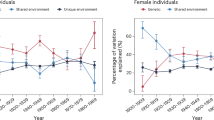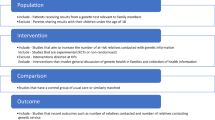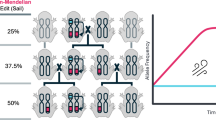Summary
Genetically abnormal or phenotypically affected individuals may influence the reproductive behaviour of other members in the family, regardless of their phenotype. This social selection is modelled by considering that whenever the normal individual has at least one affected member in the nuclear family the person has a reduced chance in mating success or in fertility compared to those from the normal nuclear family. The usual individual selection has also been incorporated using a single locus with two alleles. The gene frequency change is divided into two parts: the change due to individual selection and that due to social selection. It has been shown that a low mutation rate, a small population size and strong selection at both stages lower the equilibrium frequency of deleterious genes. The possibility of extending the single locus model for common diseases is also discussed.
Similar content being viewed by others
Article PDF
References
Buck, C, Hobbs, G E, Simpson, H, and Wanklin, J M. 1975. Fertility of the sibs of schizophrenic patients. British Journal of Psychiatry, 127, 235–239.
Dobzhansky, T. 1970. Genetics of The Evolutionary Process. Columbia University Press, New York and London.
Dobzhansky, T, and Wright, S. 1941. Genetics of natural populations. V. Relations between mutation rate and accumulation of lethals in populations of Drosophila pseudoobscura. Genetics, 26, 23–51.
Hamilton, W D. 1963. The evolution of altruistic behavior. American Naturalist, 97, 354–356.
Hamilton, W D. 1964a. The genetical evolution of altruistic behavior. I. Journal of Theoretical Biology, 7, 1–16.
Hamilton, W D. 1964b. The genetical evolution of social behavior. II. Journal of Theoretical Biology, 7, 17–52.
Levitt, P R. 1975. General kin selection models for genetic evolution of sib altruism in diploid and haplodiploid species. Proc Nat Acad Sci USA, 72, 4531–4535.
Lindelius, R. 1970. A study of schizophrenia. Acta Psychiatric Scandinavia Supplementum, 216.
Matessi, C, and Jayakar, S D. 1976. Conditions for the evolution of altruism under Darwinian selection. Theoretical Population Biology, 9, 360–387.
McKusick, V A. 1978. Mendelian Inheritance in Man, ed. 5. The Johns Hopkins University Press, Baltimore.
Morton, N E. 1978. Effect of inbreeding on IQ and mental retardation. Proc Nat Acad Sci USA, 75, 3906–3908.
Nei, M. 1968. The frequency distribution of lethal chromosomes in finite populations. Proc Nat Acad Sci USA, 60, 517–524.
Reed, T E, and Neel, J V. 1959. Huntington's chorea in Michigan. 2. Selection and mutation. American Journal of Human Genetics, 11, 107–136.
Robertson, A, and Narain, P. 1971. The survival of recessive lethals in finite populations. Theoretical Population Biology, 2, 24–50.
Templeton, A. 1979. A frequency dependent model of brood selection. American Naturalist, 114, 515–524.
Wade, M J. 1978. Kin selection: A classical approach and a general solution. Proc Nat Acad Sci USA, 75, 6154–6158.
Wallace, B. 1968. Topics in Population Genetics. W. W. Norton & Company, Inc., New York.
Wright, S. 1937. The distribution of gene frequencies in populations. Proc Nat Acad Sci USA, 23, 307–320.
Wright, S. 1938. The distribution of gene frequencies under irreversible mutation. Proc Nat Acad Sci USA, 24, 253–259.
Wright, S, Dobzhansky, T, and Hovanitz, W. 1942. Genetics of natural populations. VII. The allelism of lethals in the third chromosome of Drosophila pseudoobscura. Genetics, 27, 363–394.
Yokoyama, S. 1979. The rate of allelism of lethal genes in a geographically structured population. Genetics, 93, 245–262.
Yokoyama, S, and Felsenstein, J. 1978. A model of kin selection for an altruistic trait considered as a quantitative character. Proc Nat Acad Sci USA, 75, 420–422.
Yokoyama, S, and Templeton, A. 1980. The effect of social selection on population dynamics of Huntington's disease. Annals of Human Genetics, 43, 413–417.
Author information
Authors and Affiliations
Rights and permissions
About this article
Cite this article
Yokoyama, S. The effect of social selection on population dynamics of rare deleterious genes. Heredity 45, 271–280 (1980). https://doi.org/10.1038/hdy.1980.67
Received:
Issue date:
DOI: https://doi.org/10.1038/hdy.1980.67
This article is cited by
-
Birth control—sex preference and sex ratio
Heredity (1981)



